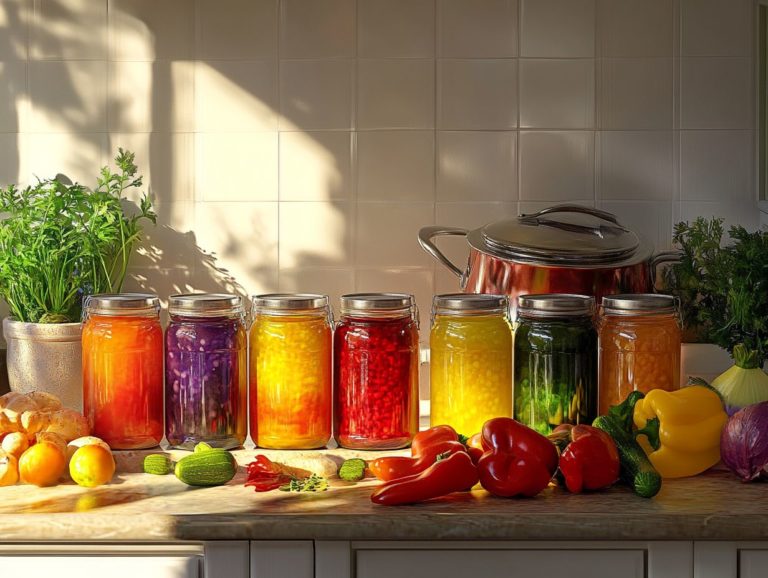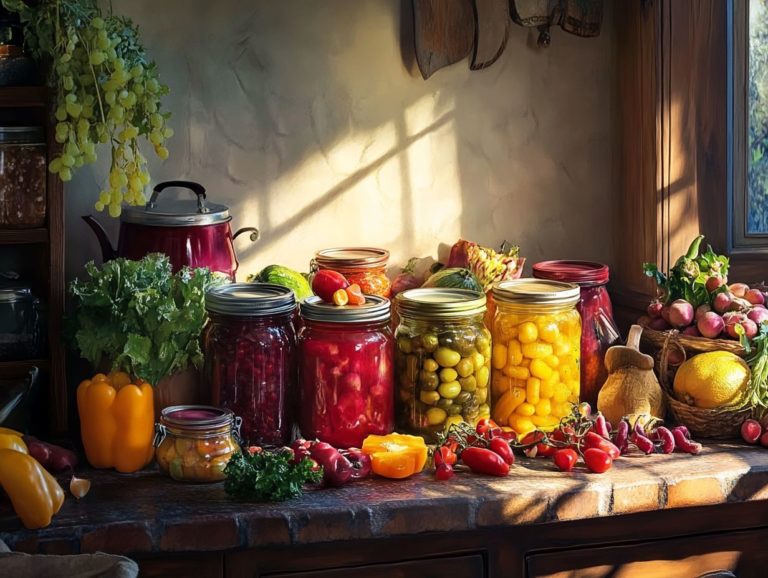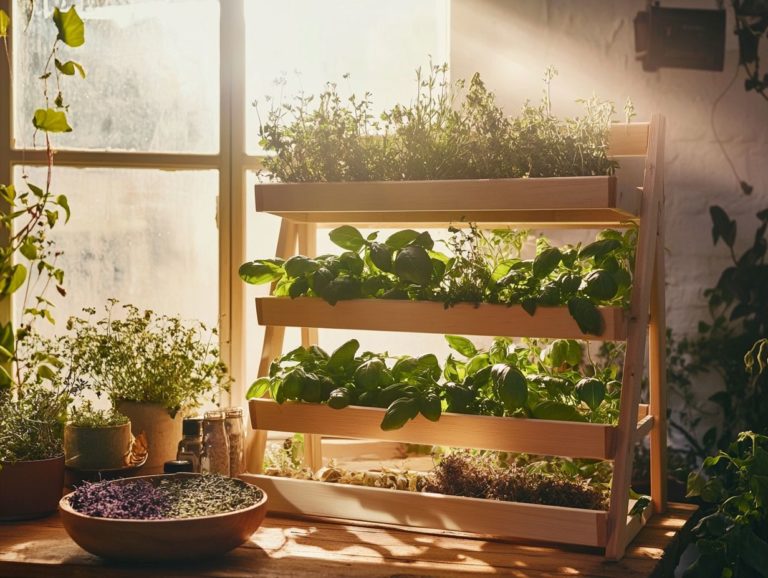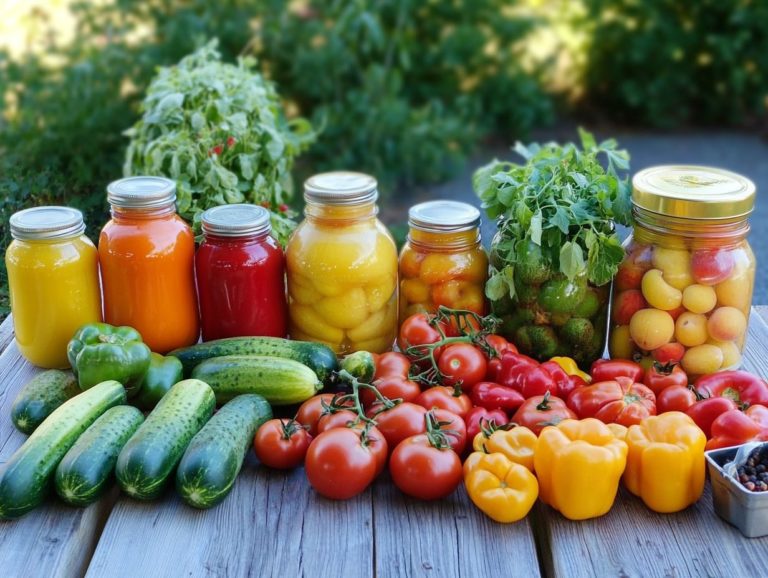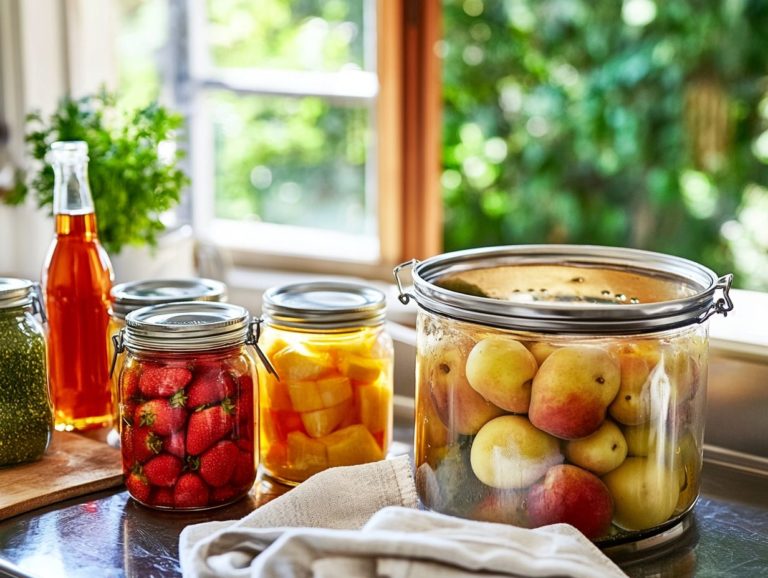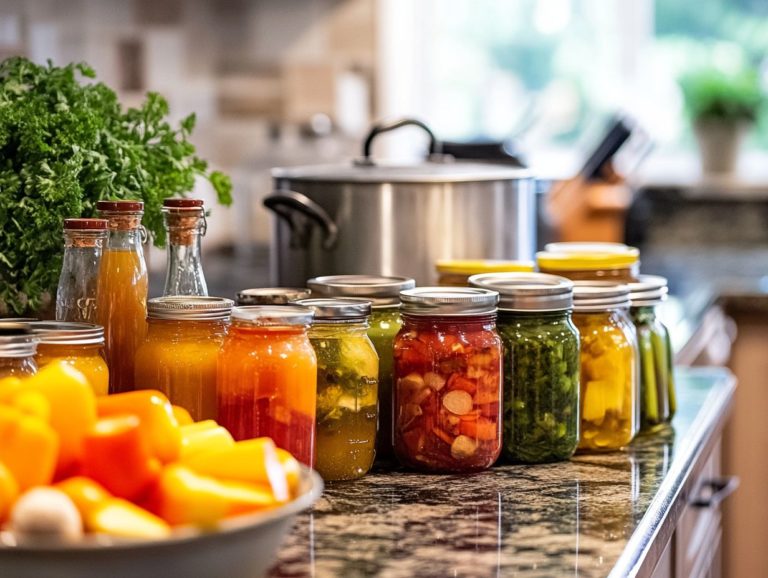How to Store Canned Goods Effectively
Storing canned goods may seem simple, but the right method can greatly affect their safety and quality. Proper storage and organization are key to getting it right.
This guide highlights the importance of storing canned goods correctly. Ignoring this can lead to risks, such as spoilage and health issues.
You ll learn how long your canned goods last and discover effective organizing tips. Whether preparing for emergencies or optimizing your pantry, this guide has you covered!
Contents
- Key Takeaways:
- Why Proper Storage is Important for Canned Goods
- Factors to Consider When Storing Canned Goods
- Best Practices for Storing Canned Goods
- How Long Can Canned Goods Last?
- Tips for Organizing Your Canned Goods
- Storing Canned Goods in Emergency Situations
- Creative Uses for Canned Goods
- Frequently Asked Questions
- What is the best way to store canned goods effectively?
- Can canned goods be stored in the refrigerator or freezer?
- What is the shelf life of canned goods?
- How can I organize my canned goods for more efficient storage?
- What should I do if I find a can with a dented or bulging lid?
- Is it safe to store canned goods past their expiration date?
Key Takeaways:
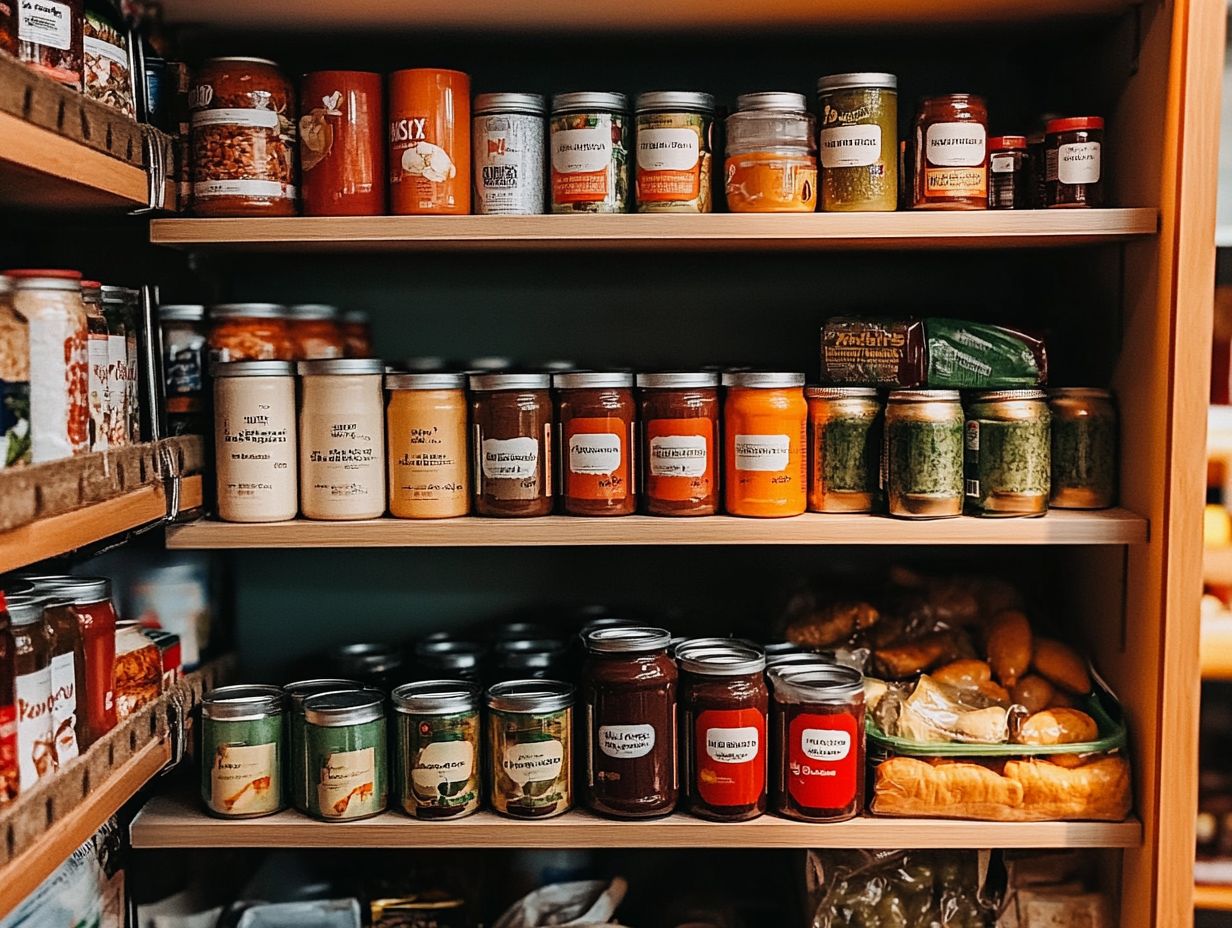
- Storing canned goods the right way keeps them fresh and safe from spoilage.
- Factors like temperature, humidity, and light are vital for keeping your canned foods good for longer.
- Labeling and organizing help maximize space and reduce waste.
Why Proper Storage is Important for Canned Goods
Proper storage of canned goods is essential for food safety and quality. Learning how to store canned goods for maximum shelf life helps prevent spoilage and extends the shelf life of your items.
When you store your goods in a dry area with good air circulation, their longevity improves. Understanding these storage methods boosts your efficiency and leads to a well-organized pantry.
Potential Risks of Improper Storage
Improper storage can lead to spoilage and foodborne illnesses, posing serious health risks. If cans are stored poorly, they might rust or corrode.
Bad storage practices create a breeding ground for harmful bacteria, increasing your risk of health problems. Damaged packaging can lead to spoilage before the expiration date.
Improper storage can also change the taste, texture, and nutritional value of your food. Sticking to food safety guidelines is crucial keep canned goods in cool, dry places and away from sunlight.
Factors to Consider When Storing Canned Goods
To store canned goods effectively, consider key factors like temperature, humidity, and light. For more insights, check out how to store your canning supplies effectively, as each of these influences how long your canned foods last.
Maintain a consistent, cool temperature in a dry area, away from direct sunlight. Proper storage is essential for protecting the nutritional quality and extends the life of your canned items, as detailed in our guide on preventing spoilage in your canned goods.
Temperature, Humidity, and Light
Temperature, humidity, and light are vital for the quality and safety of your canned goods. Store these items in a cool, dry place with stable temperatures to prevent spoilage.
Extreme heat is a big no-no. Temperatures over 85 F can speed up spoilage and compromise can seals. High humidity can cause rust, jeopardizing the can s condition, while excessive light exposure can degrade the contents, affecting taste and nutritional value.
Monitoring these factors is essential, as even minor fluctuations can turn perfectly good food unsafe to eat. By keeping a dry area and ensuring air circulation, you can keep your canned goods safe and delicious, significantly reducing waste.
Best Practices for Storing Canned Goods
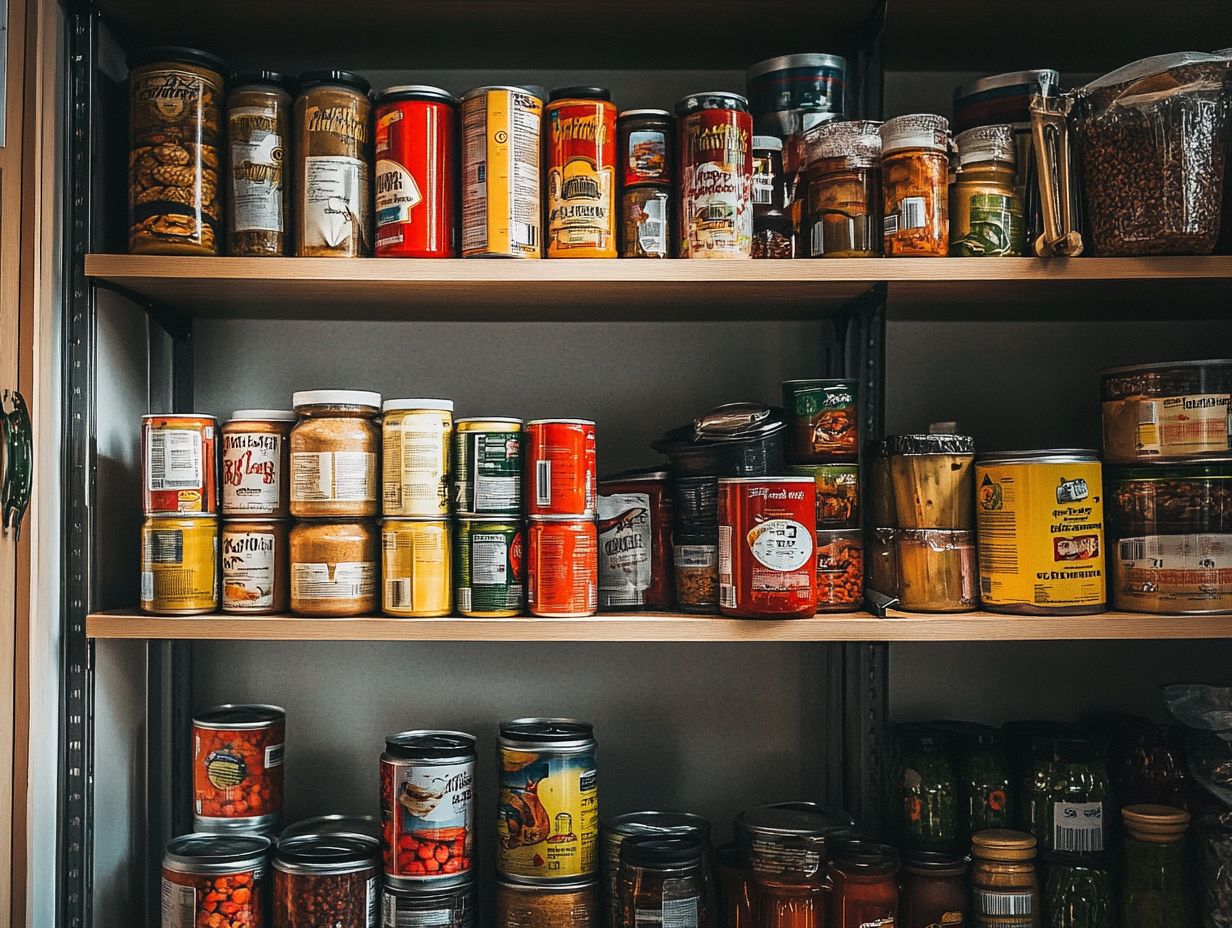
Implementing best practices for storing canned goods can elevate both the organization and safety of your food supplies. Understanding the importance of proper canning equipment storage ensures your pantry remains functional and efficient, especially through effective kitchen organization.
Emphasize clear labeling on your cans. Establish a rotation system to prioritize older items, and consider smart storage solutions like can dispensers, lazy Susans, or even magazine holders for better organization. To learn more about effectively organizing your pantry, check out this guide on how to store canned vegetables. These strategies maximize your space and streamline inventory management, making it easy to access essential canned foods.
Labeling and Rotation
Labeling and rotation are essential for keeping your pantry organized and your canned goods in top shape. Ensure all labels are facing front and implement a rotation system based on expiration dates. This helps prevent spoilage and waste while maximizing the shelf life of your food items.
These practices enhance food safety and streamline your inventory management. With clearly labeled items, identifying what needs to be used first becomes much easier, reducing the chances of overlooking older cans. Rotate items so that newer stock is placed behind the older, greatly decreasing the likelihood of dealing with expired products.
Ultimately, this ensures your pantry remains a reliable source for fresh ingredients while also contributing to sustainability by minimizing food waste and encouraging thoughtful purchasing habits.
How Long Can Canned Goods Last?
Understanding the shelf life of canned goods is crucial for ensuring food safety and managing your pantry inventory effectively. Several factors influence the longevity of these items, including the type of food, storage conditions, and the can s condition.
When stored properly, most canned goods can last for several years. However, being mindful of expiration dates is essential to uphold both quality and safety.
Shelf Life and Expiration Dates
The shelf life of canned goods varies significantly depending on the type of food and how you store it. Understanding expiration dates is vital for effective food safety. Generally, acidic foods like tomatoes don t last as long as low-acid foods like vegetables and meats.
This variation stems from acidity levels, which refer to how sour or tart a food is and influence microbial growth, affecting taste and safety over time. While it’s often safe to consume canned goods beyond their expiration dates, you might notice a decline in quality, leading to changes in flavor, texture, and nutritional value.
For instance, beans and corn can endure for several years if stored properly, while fruits may show significant degradation after just a year. Understanding these differences is essential for anyone aiming to maximize both safety and enjoyment in their meals.
Tips for Organizing Your Canned Goods
Organizing your canned goods can elevate your pantry into a useful and easy-to-reach space. This simplifies meal preparation and enhances efficiency.
By embracing creative organizing strategies like using magazine holders or a lazy Susan (a rotating tray that helps access items easily) you can maximize your space and keep all items within reach.
Categorizing your food by type or purpose will streamline your pantry even further. Grouping canned foods or canning jars together leads to a beautifully organized system that makes cooking a delight.
Maximizing Space and Accessibility
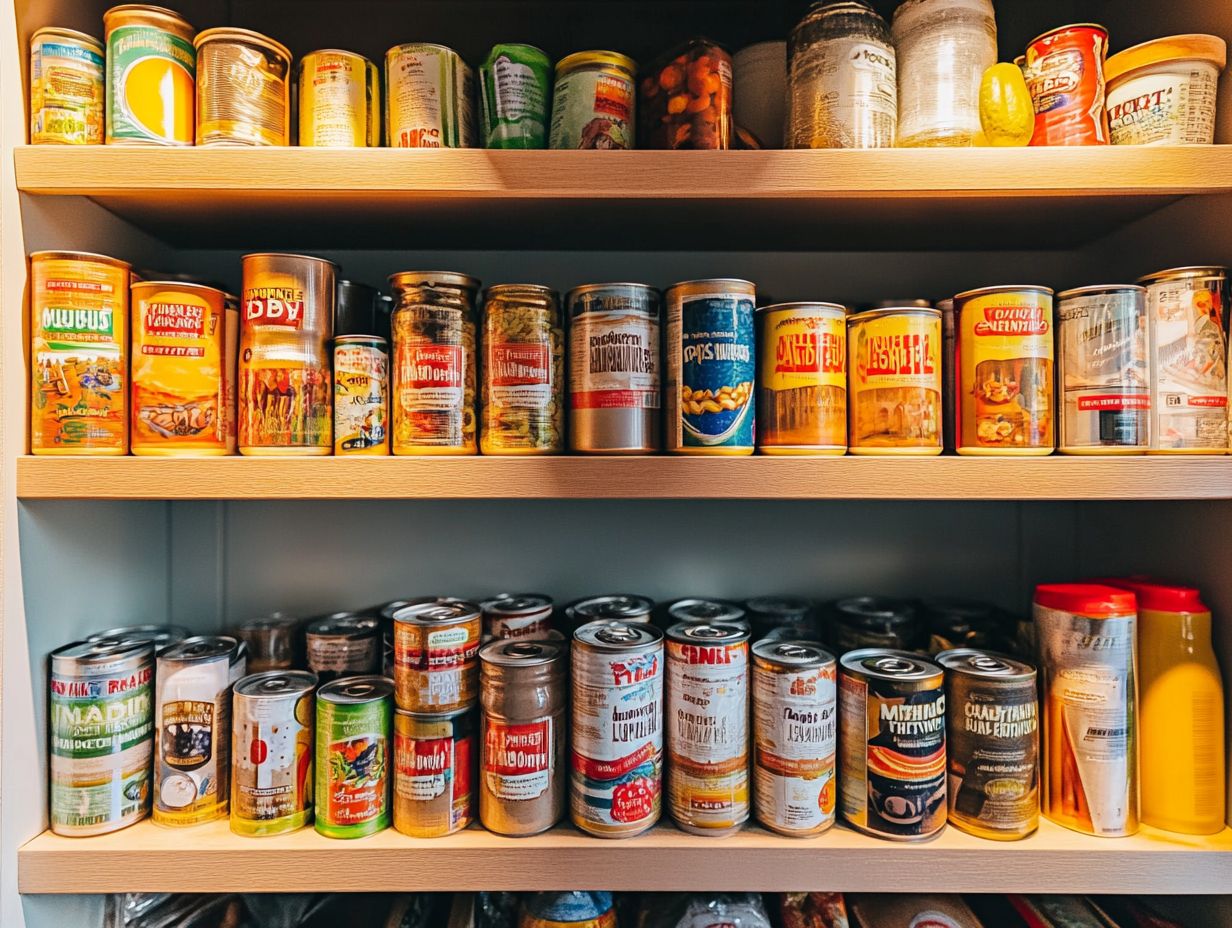
Maximizing space and accessibility in your pantry can truly elevate your experience when it comes to storing canned goods. By embracing innovative storage solutions like stadium seating arrangements or can dispensers you can ensure that every item is visible and easily reachable.
Integrating tools such as lazy Susans can work wonders. They transform tricky corner spaces into functional areas where you can effortlessly access everything stored on them.
Another savvy strategy is to use stackable bins for your dry goods. This makes it easy to categorize and grab your frequently used ingredients.
Adjustable shelves add a layer of versatility, allowing you to accommodate various pantry item heights. This makes it easier to store larger items like bulk storage containers.
Let s not overlook the creative potential of wall-mounted racks or pegboards. These options optimize vertical space and provide an organized home for your utensils and spices.
Together, these practical solutions enhance your pantry’s organization and create a more efficient cooking environment. This redefines your approach to pantry organization.
Storing Canned Goods in Emergency Situations
Storing canned goods effectively in emergencies is crucial for ensuring you have access to nutritious food during natural disasters or power outages. Understanding how to store opened canned goods safely and maintaining an organized inventory list can make a substantial difference in your preparation for unforeseen events.
To achieve this, consider implementing functional systems for kitchen organization and pantry organization.
Preparing for Natural Disasters or Power Outages
Preparing for natural disasters or power outages requires thoughtful consideration of your canned goods. This ensures both food safety and availability.
By stocking a variety of canned foods and maintaining a proper inventory list, you can create a well-rounded emergency supply that meets your needs. Utilize labels facing front to enhance organization.
In addition to a diverse selection of beans, vegetables, and fruits, pay attention to the nutritional balance of these items. Foods rich in protein such as canned meats or legumes can be particularly advantageous during emergencies.
Don t forget to regularly check expiration dates! Rotation of your food items is vital.
Regularly checking expiration dates and rotating your stock will help ensure that your supplies remain safe to consume when the time comes.
Understanding the best storage conditions, such as keeping those cans in a cool, dry space, can significantly extend their shelf life, as highlighted in the benefits of canning for food storage.
Focusing on food safety reduces waste and grants you peace of mind during an emergency. This makes the preparation process feel far less overwhelming.
Following pantry tips can enhance your efficiency.
Creative Uses for Canned Goods
Canned goods are more than mere staples for emergency preparedness; they can spark a wealth of creative possibilities in your meal preparation.
Consider using canning jars for either storage or creative recipes. From straightforward recipes to inventive meal ideas, incorporating canned foods into your cooking can elevate your culinary skills.
Good organization ensures you can find what you need quickly.
Start organizing your pantry today for peace of mind!
Recipes and Meal Ideas
Canned goods are incredibly versatile. They can spark your creativity in the kitchen.
From hearty soups to quick stir-fries, these pantry staples save you time and boost nutrition without sacrificing flavor.
Common ingredients include beans, tomatoes, and vegetables. You can easily transform these into mouthwatering dishes.
A can of black beans makes a satisfying dip or an excellent addition to salads for a protein kick.
Canned tomatoes are perfect for a rich pasta sauce or zesty chili. This makes meal prep easier and more efficient.
With so many options, trying new recipes is practical and enjoyable. You can ignite your passion for cooking!
Share your delicious creations on social media to inspire friends and family!
Frequently Asked Questions
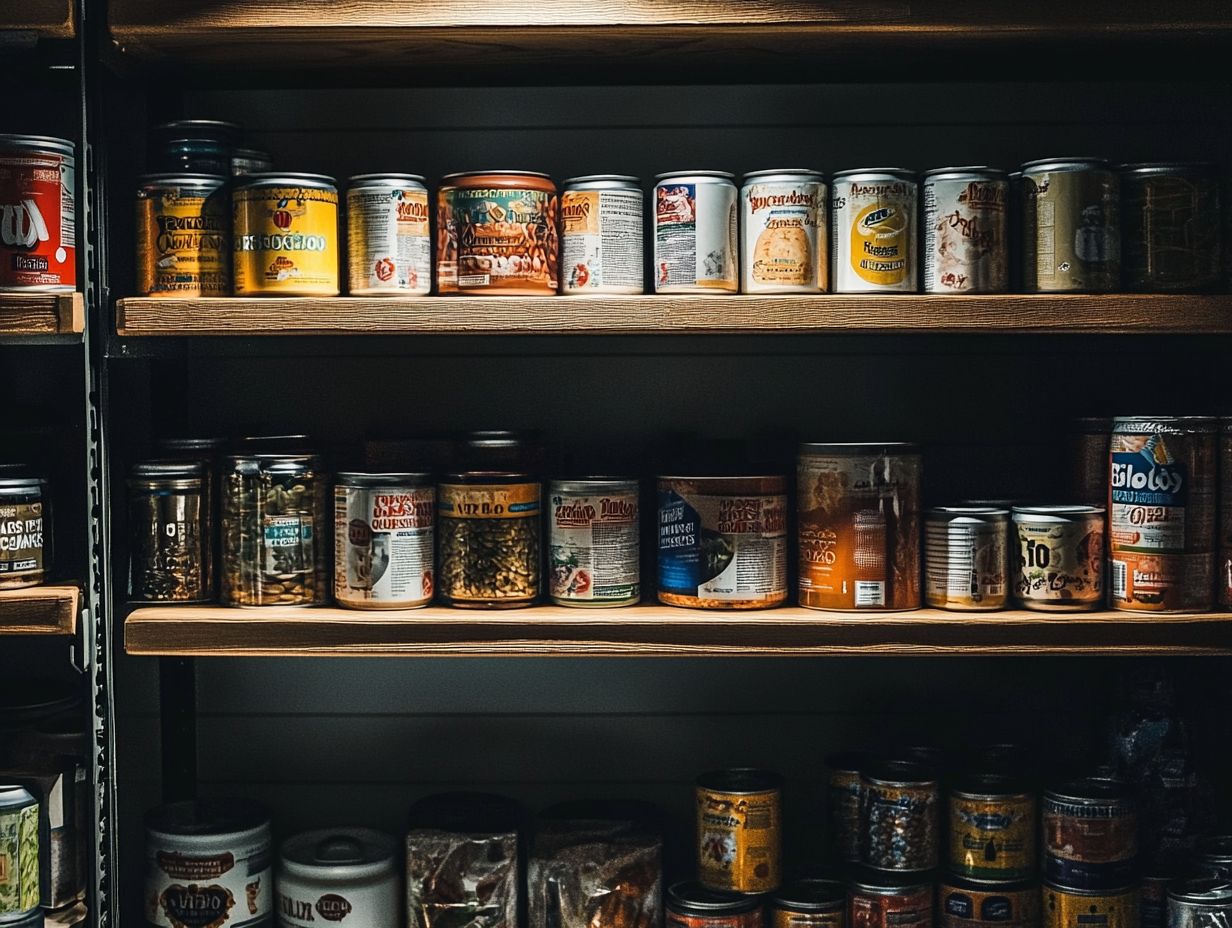
What is the best way to store canned goods effectively?
Store canned goods in a cool, dry place like a pantry or cabinet. Avoid areas with heat or direct sunlight.
Proper air circulation in your storage areas is also important.
Can canned goods be stored in the refrigerator or freezer?
Storing canned goods in the refrigerator or freezer is not recommended. They are already preserved and don t need chilling.
Freezing can cause the cans to rust or burst, affecting food quality.
What is the shelf life of canned goods?
Shelf life varies by food type and storage conditions. Most canned goods can be stored safely for 1-2 years.
Always check the expiration date on the can to maintain quality.
How can I organize my canned goods for more efficient storage?
Organize canned goods by type and expiration date. This saves space and helps you use older cans first.
Consider using magazine holders for easy access and a rotating tray for better visibility.
What should I do if I find a can with a dented or bulging lid?
Do not use a dented or bulging can. This can indicate spoilage or bacteria inside.
It s best to dispose of the can to avoid consuming potentially harmful food.
Is it safe to store canned goods past their expiration date?
Avoid consuming canned goods past their expiration date. Some may still be safe, but the quality could be compromised.
Regularly update your inventory list to keep track of expiration dates for optimal safety and quality.

